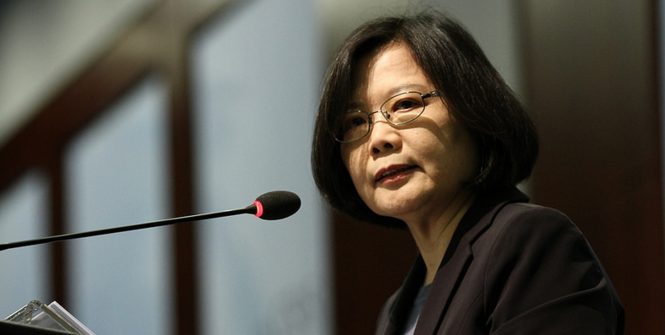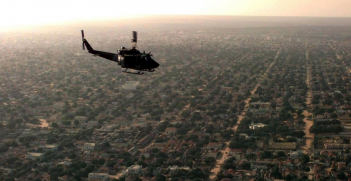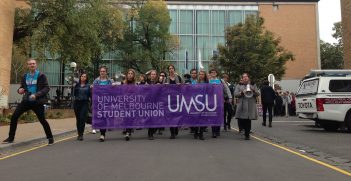New Directions for Taiwan? Cross-Strait Relations Under Tsai Ing-wen

On 16 January Tsai Ing-wen was elected as President of the Republic of China on Taiwan by a landslide. For all the worries by some commentators that this means a looming crisis in cross-strait relations, recent history should dampen these fears.
Since elections which have had universal franchise from 1996, Taiwan’s relations with the People’s Republic of China have always been subject to a huge time bomb: one simply called democracy. From the very start it introduced a new element of unpredictability into the cross-strait situation. We see the latest manifestation of that this year, with the third change of government in two decades.
The remarkable thing, however, is how in those two decades the two sides have – against the odds – surmounted the various challenges and crises they have faced. This track record gives good reason to think that they will do the same this time too.
First, some more detail on their shared history. Remember 1996, when Lee Teng-hui was elected as the first native-born national leader, and Beijing grew so agitated it started to fire practice rockets across from Fujian. A couple of US destroyers pacified things simply by sailing through the waters dividing the two. Even though Lee antagonized Beijing for four years, stating blankly once that the two entities enjoyed ‘country to country’ relations, by 2000 things had stabilized to such an extent that the Chinese were not only able to endure the election of the highly pro-independence leader, Chen Shui-bian, but also his various (in their eyes far worse) provocations, not just for four, but for eight years.
From 2008 until early 2016, Ma Ying-jeou had pursued a more conciliatory path with Beijing. This has probably made unmanageable tensions between China and his successor less and not more likely, despite her coming from a different part of the political spectrum. Taiwan-China relations now are about very tangible, practical things. Three million Mainlanders visit Taiwan as tourists each year. There are more than 800 weekly air links between the two countries. Trade has never been more inter-linked. The nett result of this is that for both sides going on the offensive with each other has become increasingly high risk.
If we look to the present, Tsai Ing-wen’s background, for all the fears of her being an ardent pro-independence supporter, show someone who is deeply pragmatic and knows perfectly well where the red lines are. She was a key negotiator over World Trade Organisation entry for Taiwan and then in charge of relations with the Mainland under Chen Shui-bian. She learnt the hard way when visiting Washington before the last election in 2011 (in which she stood) that making the US feel offside is pointless. Her inability then to reassure people that she was going to maintain the status quo meant indelicate leaks to the press and negative impact on her polling back home. Washington and Taipei’s affairs are intimately linked, at least to the extent that a leader who can’t give the Taiwanese population confidence that they can maintain the support and alliance of the US loses support in Taipei. Her visit to the US last year ran somewhat differently. There were no leaks. The US said they could work with her if the choice of Taiwanese people was for her to be the president.
The outcome of this recent history is that Beijing and Taipei have plenty of experience in handling conflicts. They were almost in constant crisis management mode from 1996 to 2008. For a part of that time, now Chinese President Xi Jinping was a senior official in Fujian province, the Mainland area with the closest trade, cultural and logistic links with Taiwan. He must have seen this and imbued some conclusions from it.
So while things won’t be easy between Beijing and Taipei, neither will they be impossible. The Mainland is hitting its toughest period for over forty years, with growth stagnating and a real economic crisis looming. That might mean leaders in Beijing ratchet up nationalism and start to forge domestic consensus by tearing into Taiwan. But the bottom line is that Taiwan as a viable, useful economic and intellectual partner is far more useful than a Taiwan under military threat, or a Taiwan devastated by attack. The worst case scenario of all-out war can never be discounted but we have to remember that in the end, at least in Washington and in capitals around the region and world, a strike on Taiwan is a strike against democracy. It would offer conclusive proof that China was indeed a threat, a revisionist power: in effect, an enemy. China would lose far, far more than it would gain from such drastic moves. That is truer now than it has been at any time since 1949 and the start of the current division because, unlike any time before, China truly has the possibility of being a wealthy, developed country within its grasp. Achieving that is an immeasurably bigger prize than regaining Taiwan.
Unlike her predecessor in the Democratic Progressive Party, Tsai is an unemotional, calm figure. That bodes well. It is unlikely that she will pursue provocative policies. She will support the status quo. The reason why she was elected so hugely is to do something about the Taiwanese economy which is still underperforming: wage levels have stayed the same in Taiwan for almost two decades, property is expensive and living costs are rising; a generation of young people has graduated from university with few high-quality career prospects. Replace “Taiwan” with “China” and the same list of problems figures top of Xi Jinping’s list. It will be their respective answers to these challenges, not lobbing insults across the Strait, which will mean they can fulfill their aspirations. So for this reason, Tsai’s victory is unlikely to usher in turbulence.
Kerry Brown is a Professor of Chinese Studies and Director of the Lau China Institute, King’s College, London and former Director of the China Studies Centre at the University of Sydney. This article may be republished under a Creative Commons License.





